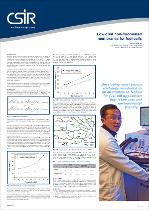JavaScript is disabled for your browser. Some features of this site may not work without it.
- ResearchSpace
- →
- Research Publications/Outputs
- →
- Conference Publications
- →
- View Item
| dc.contributor.author |
Luo, H

|
|
| dc.contributor.author |
Mathe, Mahlanyane K

|
|
| dc.date.accessioned | 2010-08-31T07:56:16Z | |
| dc.date.available | 2010-08-31T07:56:16Z | |
| dc.date.issued | 2010-08-31 | |
| dc.identifier.citation | Luo, H and Mathe, M. 2010. Low-cost non-fluorinated membranes for fuel cells. CSIR 3rd Beinnual Conference 2010, Science Real and Relevant, CSIR International Convention Center, Pretoria, South Africa, pp 1 | en |
| dc.identifier.uri | http://hdl.handle.net/10204/4235 | |
| dc.description | CSIR 3rd Beinnual Conference 2010, Science Real and Relevant, CSIR International Convention Center, Pretoria, South Africa | en |
| dc.description.abstract | Energy is one of the most important factors that will influence the shape of society in the 21st century. Fuel cells are electrochemical energy converters, transforming chemical energy directly into electricity. Fuel cells are the main zero emission energy converters fed with hydrogen or renewable fuels like methanol and ethanol to power vehicles, portable devices or to supply electricity to buildings. Fuel cell technology will forever change our concept of alternative energy systems and will become the driver of the next growth wave of the world’s economy. A proton conductive membrane is the core of the polymer electrolyte membrane fuel cell (PEMFC). Presently, Nafion® membranes are widely used in PEMFC. However, the high cost, low operation temperature (<80°C), propensity for dehydration, high methanol crossover, and environmental recycling uncertainties of Nafion® and other similar fluorinated membranes are limiting their widespread commercial application in PEMFC and DMFC [1-3]. Therefore, developing cheaper membranes with low methanol crossover have become an active area of research We developed low-cost proton conductive membranes based on non-fluorinated polymer. The membranes are thermally and chemically stable, mechanically strong, highly proton conductive and have low fuel crossover. | en |
| dc.language.iso | en | en |
| dc.publisher | CSIR | en |
| dc.subject | Non-fluorinated membranes | en |
| dc.subject | Fuel cells | en |
| dc.subject | CSIR Conference 2010 | en |
| dc.subject | Energy | en |
| dc.title | Low-cost non-fluorinated membranes for fuel cells | en |
| dc.type | Conference Presentation | en |
| dc.identifier.apacitation | Luo, H., & Mathe, M. K. (2010). Low-cost non-fluorinated membranes for fuel cells. CSIR. http://hdl.handle.net/10204/4235 | en_ZA |
| dc.identifier.chicagocitation | Luo, H, and Mahlanyane K Mathe. "Low-cost non-fluorinated membranes for fuel cells." (2010): http://hdl.handle.net/10204/4235 | en_ZA |
| dc.identifier.vancouvercitation | Luo H, Mathe MK, Low-cost non-fluorinated membranes for fuel cells; CSIR; 2010. http://hdl.handle.net/10204/4235 . | en_ZA |
| dc.identifier.ris | TY - Conference Presentation AU - Luo, H AU - Mathe, Mahlanyane K AB - Energy is one of the most important factors that will influence the shape of society in the 21st century. Fuel cells are electrochemical energy converters, transforming chemical energy directly into electricity. Fuel cells are the main zero emission energy converters fed with hydrogen or renewable fuels like methanol and ethanol to power vehicles, portable devices or to supply electricity to buildings. Fuel cell technology will forever change our concept of alternative energy systems and will become the driver of the next growth wave of the world’s economy. A proton conductive membrane is the core of the polymer electrolyte membrane fuel cell (PEMFC). Presently, Nafion® membranes are widely used in PEMFC. However, the high cost, low operation temperature (<80°C), propensity for dehydration, high methanol crossover, and environmental recycling uncertainties of Nafion® and other similar fluorinated membranes are limiting their widespread commercial application in PEMFC and DMFC [1-3]. Therefore, developing cheaper membranes with low methanol crossover have become an active area of research We developed low-cost proton conductive membranes based on non-fluorinated polymer. The membranes are thermally and chemically stable, mechanically strong, highly proton conductive and have low fuel crossover. DA - 2010-08-31 DB - ResearchSpace DP - CSIR KW - Non-fluorinated membranes KW - Fuel cells KW - CSIR Conference 2010 KW - Energy LK - https://researchspace.csir.co.za PY - 2010 T1 - Low-cost non-fluorinated membranes for fuel cells TI - Low-cost non-fluorinated membranes for fuel cells UR - http://hdl.handle.net/10204/4235 ER - | en_ZA |






